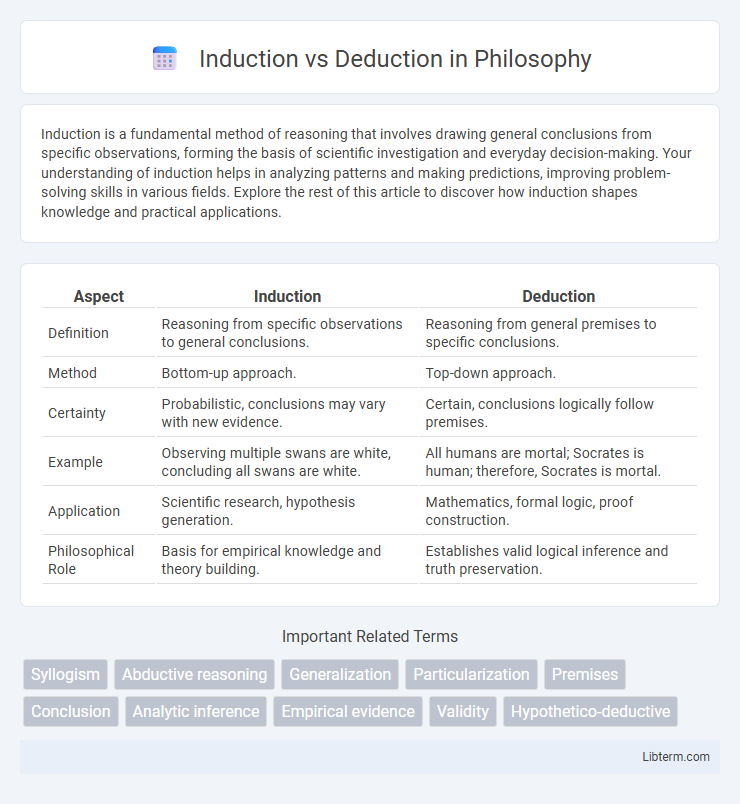Induction is a fundamental method of reasoning that involves drawing general conclusions from specific observations, forming the basis of scientific investigation and everyday decision-making. Your understanding of induction helps in analyzing patterns and making predictions, improving problem-solving skills in various fields. Explore the rest of this article to discover how induction shapes knowledge and practical applications.
Table of Comparison
| Aspect | Induction | Deduction |
|---|---|---|
| Definition | Reasoning from specific observations to general conclusions. | Reasoning from general premises to specific conclusions. |
| Method | Bottom-up approach. | Top-down approach. |
| Certainty | Probabilistic, conclusions may vary with new evidence. | Certain, conclusions logically follow premises. |
| Example | Observing multiple swans are white, concluding all swans are white. | All humans are mortal; Socrates is human; therefore, Socrates is mortal. |
| Application | Scientific research, hypothesis generation. | Mathematics, formal logic, proof construction. |
| Philosophical Role | Basis for empirical knowledge and theory building. | Establishes valid logical inference and truth preservation. |
Understanding Induction and Deduction
Induction involves reasoning from specific observations to broader generalizations, forming hypotheses based on patterns identified in data. Deduction starts with a general premise or theory and logically derives specific conclusions that must be true if the premises are correct. Mastering induction and deduction enhances critical thinking by enabling the evaluation of evidence and the construction of sound arguments in scientific and philosophical contexts.
Key Differences Between Inductive and Deductive Reasoning
Inductive reasoning involves drawing general conclusions from specific observations, while deductive reasoning starts with general premises to reach a specific conclusion. Induction is probabilistic, meaning conclusions are likely but not guaranteed, whereas deduction provides logically certain conclusions if premises are true. Key differences include the direction of logic--bottom-up for induction and top-down for deduction--and the level of certainty associated with each method.
The Foundations of Inductive Reasoning
Inductive reasoning builds knowledge by forming generalizations based on specific observations, relying on patterns and repeated experiences to infer probable conclusions. Its foundation lies in empirical evidence, where the strength of an inductive argument depends on the quantity and representativeness of the data collected. Unlike deduction, induction accepts uncertainty, emphasizing hypothesis generation and probabilistic reasoning in scientific inquiry and everyday decision-making.
The Basics of Deductive Reasoning
Deductive reasoning involves drawing specific conclusions from general principles or premises that are assumed to be true, ensuring logical certainty if the premises are valid. It follows a top-down approach, starting with a broad theory and narrowing down to a specific outcome or prediction. Common examples include syllogisms and mathematical proofs where conclusions necessarily follow from given premises.
Real-Life Applications of Induction
Inductive reasoning plays a crucial role in real-life applications such as scientific research, where observations and experiments lead to general theories and hypotheses. In data analysis, inductive methods help derive patterns and trends from specific datasets, enabling predictive modeling and decision-making. Fields like machine learning and medical diagnosis utilize induction to formulate rules and classifications based on empirical evidence.
Real-World Uses of Deduction
Deduction plays a critical role in fields like law, where judges apply established statutes to specific cases to arrive at rulings, ensuring consistent enforcement of legal principles. In computer science, deductive reasoning powers algorithms and formal verification methods that validate software correctness by logically deriving outcomes from predefined rules. Scientific investigations employ deduction to test hypotheses by applying general theories to particular experiments, allowing precise predictions and systematic validation.
Strengths and Limitations of Inductive Logic
Inductive logic excels at generating hypotheses and theories from specific observations, enabling flexibility and adaptability in learning from new data. Its strength lies in dealing with uncertainty and providing probabilistic conclusions, which makes it valuable in scientific research and everyday reasoning. However, inductive logic is limited by the potential for incomplete or biased data leading to false generalizations, and its conclusions lack absolute certainty compared to deductive reasoning.
Advantages and Weaknesses of Deductive Logic
Deductive logic guarantees conclusions that are logically certain if the premises are true, making it highly reliable for formal reasoning and mathematical proofs. Its main strength lies in providing definitive proofs but is limited by its dependence on the accuracy of initial premises and inability to generate new knowledge beyond those premises. Deductive logic struggles with real-world complexity and ambiguity, as it cannot adapt to incomplete or evolving information like inductive reasoning can.
Choosing the Right Approach: Induction or Deduction?
Choosing between induction and deduction depends on the nature of the problem and available data; induction generates hypotheses from specific observations, ideal for exploring unknown patterns, while deduction tests predefined theories through logical reasoning, suitable for confirming established principles. Effective decision-making in research or analysis requires assessing whether you need to build new models from empirical evidence or validate existing frameworks using structured logic. Balancing these approaches enhances critical thinking and ensures accurate conclusions in scientific, academic, and real-world investigations.
Conclusion: Balancing Inductive and Deductive Reasoning
Balancing inductive and deductive reasoning enhances analytical accuracy by combining specific observations with general principles. Inductive reasoning generates hypotheses from empirical data, while deductive reasoning tests these hypotheses through logical deduction. Integrating both methods strengthens conclusions by validating patterns with established theories, fostering comprehensive understanding and robust decision-making.
Induction Infographic

 libterm.com
libterm.com